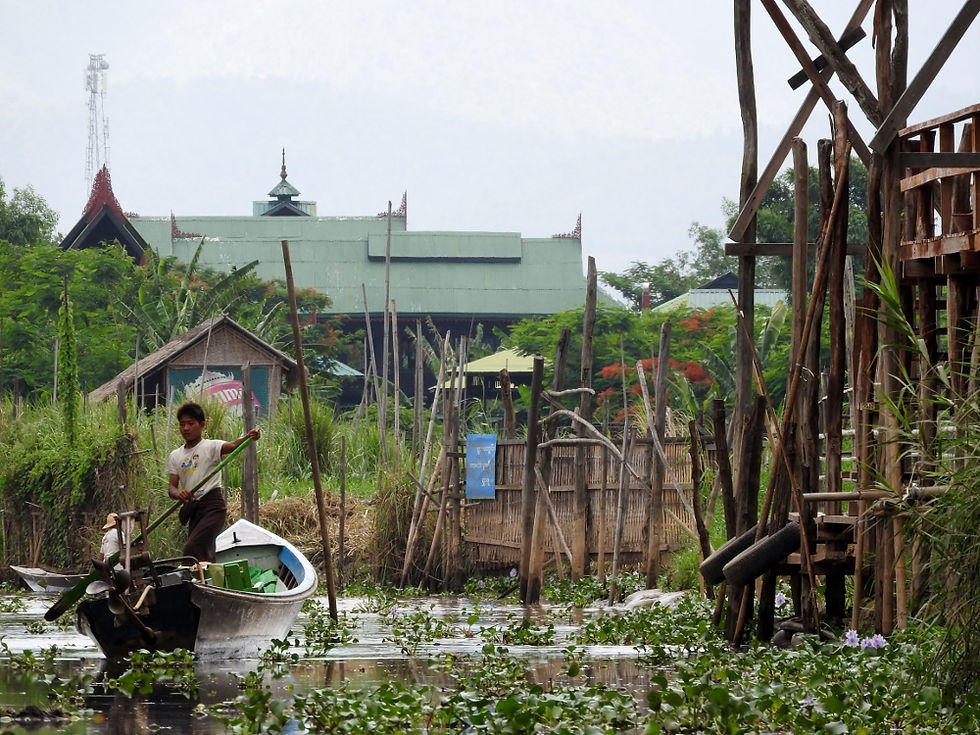A lake of challenges
- 26 maj 2016
- 3 minut(y) czytania

A lake of challenges
INLE HERITAGE
Inle| Myanmar
-
We met Aung Kyaw Swar from Inle Heritage completely by chance. We were at the Inle lake, one of the most beautiful spots in Myanmar, organizing a workshop for an NGO called Inle Speaks. The last day we decided to rent a boat and go visiting the lake. To save some money we were looking for somebody to share the boat with. Finally, one girl agreed. She was not that interested in touring the many pile-dwelling shops of weavers, blacksmiths or cigar makers – main tourist destinations. Actually, her main goal was to visit Inle Heritage, which turned out to be a social enterprise with lots of projects: their main goal is to protect Inle lake, which is already hardly damaged in many ways; they train young people in high class hospitality, giving them the opportunity to find a job; they are trying to save the close-to-extinction, elegant Burmese cats; and they have a high quality hotel built directly in the middle of the lake. The place is amazing, although it constantly face quite a number of challenges.
Every day we are dealing with human beings and we are not professional trainers, it’s not our background. It’s only the third year. The space is limited, facilities we provide are limited and the surrounding area, the lake, is quite noisy because of tourists and especially because of the engine of the boats. We are running a 6-room hotel and it’s a kind of premium brand. We also have premium price we charge clients with. That means actually more and more restrictions on ourselves in terms of service we provide, to make clients happy. We have to set rules. For example, we have a playground but we can’t let kids play as much as they want. The noise is not always good as we have to care about clients. In late afternoon the scenery and everything goes tranquil. Another challenge… our students are pretty young, between 17 and 23, they are full of energy and we cannot provide the way they want to enjoy life, apart from studying. It’s our limitation, part of the challenge. And not really a big thing, but maybe challenging as well are finances. We want to reach long term sustainability but with the market system, competitiveness, with staff’s salary, etc. it is not easy. We also have quite high maintenance costs.
Maintenance costs are related mainly to the water they are surrounded by. But they have plenty of ideas to get more resources and, above all, to help the local community even more.
We are going to expand our social business. We will produce and offer more products in our souvenir shop. We want to give more benefits to product makers, weavers, etc. When this is done, we want to open a foundation. Have you visited a weaving factory? Some of the weaving techniques are actually endangered. Less young people are interested in learning them; because of the sophisticated patterns, you need a lot of patience and it’s time-consuming. The other thing is wages. You can pick up easy or difficult weaving techniques, but the wage is the same. So people just pick up easier one. We want to change this. All the products will be sold through this shop under the foundation. And another project: we are trying to build a private school. The school is going to be built from bamboo. We are working with an expert group from Thailand. They are going to build this really, really beautiful architecture. And after that, ideally we will follow with bamboo training to produce crafts.
The involvement of Aung and his energy come directly from his parents’ teaching and from Buddhism.
We feel that the country is so poor because of lack of education and limited opportunities for already educated people. I come from an ordinary family; my father is an ex-monk and also my mother studied Buddhism, so religion influenced me a lot and it’s mostly about caring and sharing with others. Being a human being we believe that you need to do something for the others as well.
Even if it's not that easy.
Change is not an easy task. I see it as a process. If you don’t believe in anything, actually the change doesn’t come. You have to believe in something that you want to change. And be happy with it. From this what you need is education and everyone’s participation. Change doesn’t happen on your own, you need a community.
More about Inle Heritage: inleheritage.org




































Komentarze